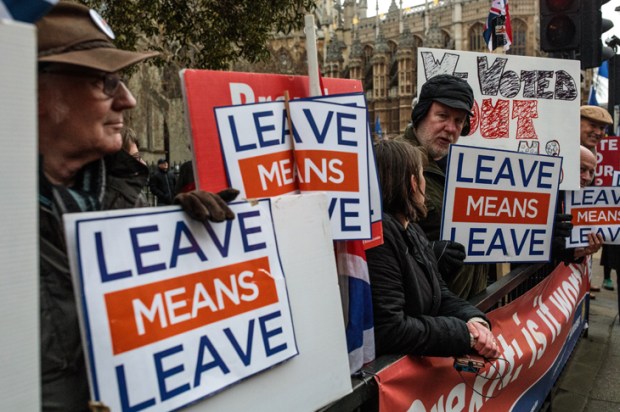Omissions can be as instructive as inclusions. I noted a curious example in a column Nick Timothy wrote last month for the Daily Telegraph: ‘Why Dominic Grieve’s push for a “meaningful vote” really would mean stopping Brexit.’ Until he left Downing Street, Mr Timothy was jointly principal adviser to Theresa May. He wrote the following:
‘According to ministers, the choice Parliament will face is to leave on the terms negotiated by the government, or leave with no deal. And they are right: the European treaties assert that the withdrawal process can last no longer than two years…’
This is not the case. Mr Timothy seems to have overlooked a key provision laid out in Article 50 of the relevant treaty (my italics):
‘3. The Treaties shall cease to apply to the State in question from the date of entry into force of the withdrawal agreement or, failing that, two years after the notification referred to in paragraph 2, unless the European Council, in agreement with the Member State concerned, unanimously decides to extend this period.’
It seemed worrying that this provision, which is highly inconvenient to his argument, had escaped Mr Timothy’s notice. My worries had first been aroused earlier in his column when he remarked that the formal notification of an intention to leave the European Union Article cannot later be withdrawn because ‘[as] Lord Pannick QC argues, this is now irreversible: “The bullet has been fired and nothing will bring the bullet back to the gun.”’
Lord Pannick did say this to the Supreme Court when arguing (successfully) for Parliament to be given a meaningful vote on a draft treaty, but my understanding is that to help the court focus without distraction on the issue of a parliamentary vote, both sides in the case had agreed in open court that they wished the argument to proceed as though notification were irreversible. Lord Pannick may well believe that as well as being an agreed position for the purposes of the court’s deliberations, it is also true; but he knows there are others (including Lord Kerr of Kinlochard, who drafted this part of the treaty) who believe otherwise. This is a matter of dispute, not an agreed legal opinion. Again, it would have helped readers’ understanding if Mr Timothy had acknowledged that.
So let’s get to the nub of this. Whether it’s true that nothing can stop the United Kingdom leaving the EU by midnight on 29 March has now become a question of the utmost importance. For those who want to talk MPs out of voting down Theresa May’s proposed withdrawal treaty later this year, it will be enormously helpful if they can claim that Britain will be standing at the cliff’s edge. If the government’s deal is rejected (they’ll want to insist) it will be too late to try to improve it: we shall crash out of the EU on no terms at all.
But this is untrue. To present the decision in those terms is a false dichotomy. There exists one certain and one possible alternative path.
I myself have no doubt that if, even at this late stage, the UK were to repent of its intention to quit the EU, a way would be found for us to stay in, and hopefully on the existing favourable terms that John Major negotiated at Maastricht. One of many Leavers’ most common gripes about the EU is that when the rules don’t suit them, they cheat their way past them. I wouldn’t go so far as that, but do believe that if the will were there, it would be possible to interpret the Lisbon Treaty as permitting a change of heart; and that the will would be there. The rest of the Union regrets our decision to leave, which is no more in their interests than in ours.
But that’s only my guess. What’s a fact is that we can extend the period of negotiation for up to another two years if all our partners agree.
We should do this anyway. In all logic, can you think of a single advantage that a two-year ‘implementation’ or ‘transition’ period has over a prolongation of the negotiations? In the latter case we keep our seat at the EU table, and the leverage that offers. In the former case we cease to be partners negotiating a divorce, and become instead supplicants in the court of a foreign power.
Be honest: the only reason the logic of this argument has been shoved aside is that Leavers are desperate to get us over the line — and out — as soon as possible, in case circumstances and the winds of public opinion should change. ‘Sign here!’ they demand, like loan sharks anxious to bounce a potential client into sealing the deal, as the nation’s hand hovers over the small print of Brexit. But it’s very possible that as Theresa May’s administration flounders ever deeper into the Brexit bog, the question of an Article 50 extension will begin to lead the news. Don’t let Nick Timothy’s omission mislead you: this option is available.
And with a pleasing irony, it does seem possible that it is Mr Timothy’s side that may soon be re-examining the possibility. For it now appears likely that the threat to the successful parliamentary passage of the ‘meaningful vote’ this autumn may be coming as much from the Leavers as from some Remain MPs. As I write, the Brexiters’ opinion seems to be hardening around outright opposition to any likely draft treaty that may finally emerge from the Chequers cabinet meeting this month.
What grisly fun it would be if, as summer proceeds, anxious Brexiters begin assuring wavering MPs that we need not, after all, tumble headlong out of the EU with no deal at all if Parliament votes Mrs May’s plans down. All at once they may begin to see ways the government could be persuaded to take a second look. How delicious.
Got something to add? Join the discussion and comment below.
Get 10 issues for just $10
Subscribe to The Spectator Australia today for the next 10 magazine issues, plus full online access, for just $10.
You might disagree with half of it, but you’ll enjoy reading all of it. Try your first month for free, then just $2 a week for the remainder of your first year.















Comments
Don't miss out
Join the conversation with other Spectator Australia readers. Subscribe to leave a comment.
SUBSCRIBEAlready a subscriber? Log in